
Well, some of it. The rest has limited appeal, though.
I do have to say that this sequence is very effective in its intertwined use of narrative and visual scaling - the latest, seemingly conclusive chapter in the Avalanche-Shinra showdown interrupted by the unignorable attack of the gargantuan Sapphire Weapon, Shinra's vise grip on the upper hand in global power dynamics no longer absolute; the intercutting between the playable sequences with your little Lego characters in their dollhouse environments and the flashy, then-mindblowing CG cutscenes of the nail-biting ongoing battle between the Weapon and all of Junon's military strength; how tiny Barret is as, in a pathetically directionless attempt to save Tifa's life, he scrambles across the massive airport facility, thrown into complete panic under the Sapphire Weapon's attack, or Tifa is as she shimmies up, down, and along the massive cannon assembled to combat it. It's a great example of the game taking advantage of its platform's new capabilities to tell its story - a potent, technically-proficient illustration of how the status quo is now being exploded by a third party and none of our characters is the master of their fate anymore.
...Well, not quite. The Back to the Future II-esque rescue of Tifa and reunion of the party aboard the newly-acquired Highwind is the very first pure moment of unshadowed triumph in the game. The soundtrack has been absolutely devoid of exhilarating music until this point, which makes the score here like a blast of fresh air. Add to that how, in a situation of complete helplessness, the party members got out using their own devices, and how the members of the Highwind talk about being so inspired and touched upon meeting Cid that it incited them to revolt against Shinra's malfeasance - that in a game that, when it wants to be about something, is about a universally-corrupted world, someone in the party actually inspired other human beings to make a moral choice and do the right thing - and it's a strong adrenaline rush.
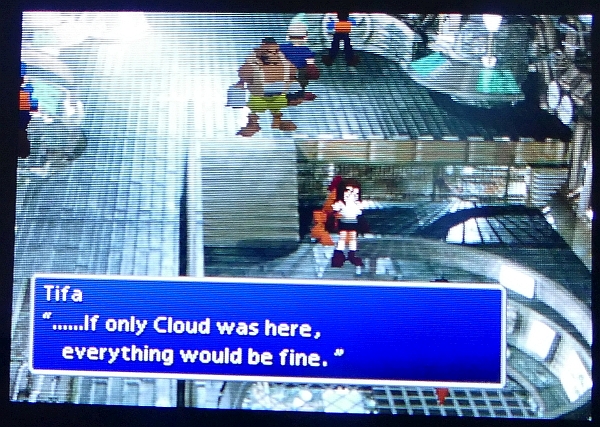
But - and there is always a "but" with FF7 - it's held back by the party's subsequent convinction that "We need Cloud. We're nothing without Cloud." CLOUD CONDEMNED THE PLANET TO DEATH. CLOUD IS PART OF SEPHIROTH NOW. The game has a huge, genre-busting moment where the hero turns heel and leaves the rest of the party to its own devices - followed by a sequence where the party members defy relegation to the dustbin, actually, take control of the story that supposedly isn't theirs, and wrest victory from the jaws of defeat - and it immediately undermines it by emphasizing that the party can't work and is so helpless without Cloud. I was fast-forwarding through Tifa's ridiculous here that I missed taking a photo of Barret's "Tifa! When'd you become such a wimp?" line, which I deeply regret.
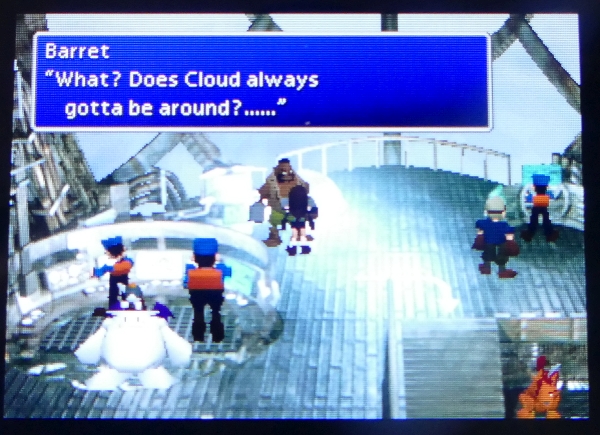
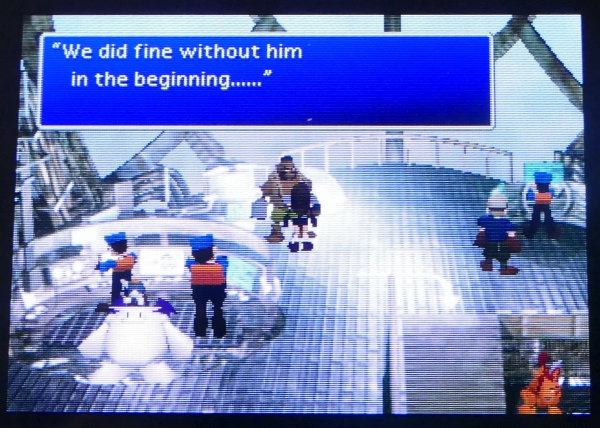
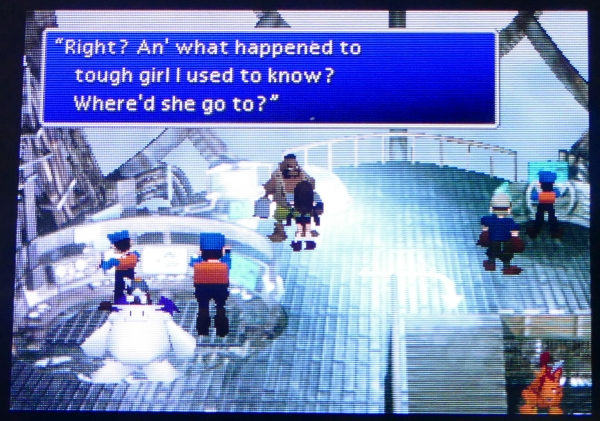
I got this, though. They set this up like, "oh, Barret, wrong again," but Barret is right, goddamn it! Wallace2020.jpg
Admittedly, Tifa's attitude probably reflects a delayed shock and sense of loss at Cloud's betrayal - in which case, the game is doing exactly what I praised it for avoiding before with defining RPG heroines through romantic conventions, good job - but the game's awfully convinced she's right.
Also: "Cloud would...stand that cocky little way he did, and tell us what to do." Again: He never did that! The game is acting like it created this essential, impressible, indelible character when it never did - another in a long line of the game, instead of doing something, just pretending it already did and giving itself a big pat on the back. I guess it worked! It hornswaggled enough people to get Cloud to the top of that big character poll, after all.
I'm not a fan of FF6, but when things went to hell in that game, those left standing decided: "fuck it, we're going to find a way forward." (It was the entire thematic drive of the World of Ruin - and the overall game, in fact.) The gameplay approaches emphasize the titles' differences in perspective: in FF6, you can indeed soldier forward with your little band of three right to the end of the game - you can find your own way to a resolution. In FF7 - just to jump ahead here - you'll stumble about several promising leads - a sunken weapons carrier, some Shinra operations to excavate huge materia, a few new caverns on the map - but the game won't let you do anything with them until you address the Cloud situation, at a point where you shouldn't be thinking there's anything left of the Cloud situation to address.
I wish they gave the option not to go get Cloud. I don't think games understand the benefit of subtractive choice enough - giving the player the option not to engage with parts of the story that aren't of interest. My best experiences with FF6 have been during Celes-Edgar-Setzer runs of the World of Ruin - cutting the cast and interaction with other human beings to the bare bone enhances the lonely, desolate atmosphere in the story immeasurably. When Neo Angelique let me ditch the bratty boy-prince Rene and not have him be part of the story, it enriched the experience so by keeping the cast to an immediate family I liked instead of forcing things to center around a disruptive presence. Not everything is going to click with everyone, and games are generally stronger when they acknowledge that.
(Before we leave this section, some complaints about the Sister Ray sequence: 1) once again, unnecessary combat is detrimentally present in a sequence already suffused with challenge and tension from other sources; 2) the game expects you to have the layout of the Junon fort from like twenty hours ago still memorized; 3) the slapfight bit, besides being another terrible minigame, is sexist and beyond idiotic, particularly given that Tifa routinely beats robots to death with her bare hands.)

I liked the composition in this screen, but my camera was on some weird twinkle Christmas-light setting when I took a shot of it.
Onward. The parallels to 6's apocalypse drive home how FF plots are very much iterations of previous game's plots: in FF6, the world falls through thirst for power through conquest, while here, it is imperiled by thirst for power through money-grubbing. Traveling through a world that's *about* to be destroyed rather than one that *has* been destroyed does shift the inhabitants' perspective significantly, though. I liked talking to the people in the World-of-about-to-Be-Ruin; their remarks weren't always scintillating, but there were enough who, say, noted odd phenomena, as the beach bum how it's "creepy" to see Meteor in the reflection of the water while they swim at the resort, or had personal revelations, like the one guy at Cosmo Canyon who says he can't be standing around pontificating about Planet Theory anymore; he has to get back to his homeland. It's odd that everyone knows what, specifically, Meteor is - instead of just, aaah, it's a meteor heading straight for us, they know it by its capital-M name and who called it and what it does and means.
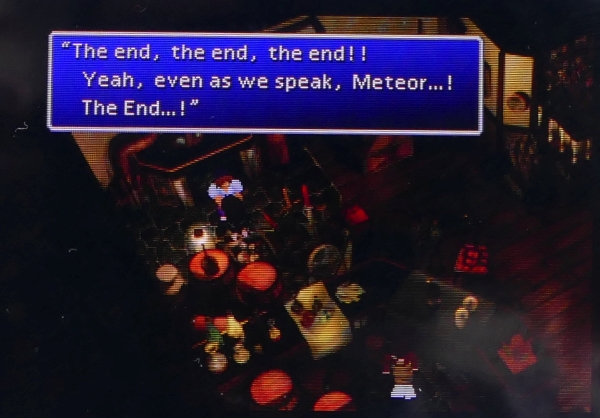
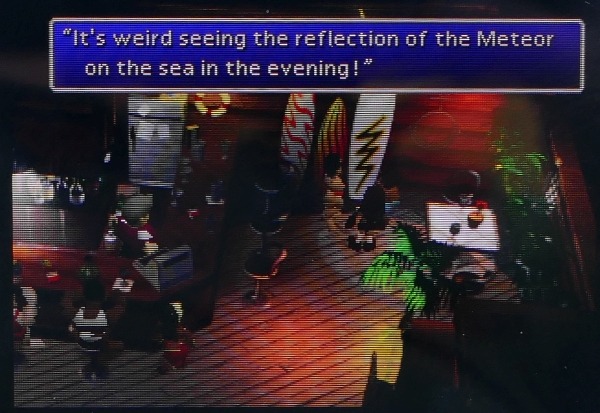
Yuffie also tried to sneak into the party a couple times, but see the game's previous statements about trains and the stopping thereof.
The overworld theme now is perhaps one of my favorites in what of the Final Fantasy series I've played. Though the game sometimes botches them, I do like the cues it's taken from the horror genre - this and the soundtrack cue when Cloud is losing his mind, the Shinra H.Q. massacre, the look of Jenova's...mask, I guess? The PS1 is much-maligned nowadays, not entirely unfairly, but it did a lot for horror.
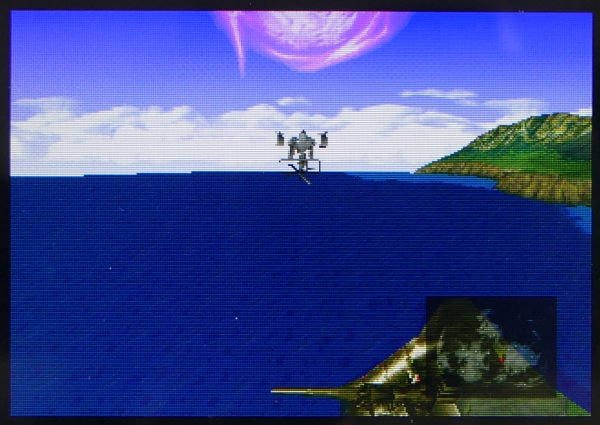
Taking control of the airship for the first time to have the dead burn of Meteor hanging in the sky above and dominating the soundtrack is also a great moment.
As mentioned above, I ran across a few potential leads with which I couldn't do anything. Tifa is in the lead of the party during the traditional Final Fantasy post-airship "you have the run of the planet" section, and though you're pretty heavily signposted to go to a spot in the southern isles, I wanted to do anything I could to extend my Cloud-less time with the game. I found a few forested islands with caves where the Highwind could not land, which I learned, through consulting an FAQ to see if there were anything I could do to extend my Cloud-less time with the game, are locked behind the presumably-massive Chocobo breeding sidequest, about which I could not possibly care less. (I am probably going to use a guide to pick and choose my quests for the endgame, as I'm not engaged enough to do everything.)
Tifa's turn at the helm is regrettably short-lived, though. Once you do investigate that town in the southern islands, you'll discover a catatonic Cloud, who traveled via the Lifestream, the literalized glowing-green stream of the planet's energy, all the way from the North Pole to the other end of the globe. (No word on why or how he separated from Sephiroth after the Inside scene, where he surrendered any semblance of an independent ego.) He's wheelchair-bound and completely unresponsive (symbolized by a persistent wheelchair squeak that's atmospheric and appropriately horror-inspired at first but becomes aggravating as it plays continuously throughout the hospital scenes, particularly since Cloud's wheelchair isn't moving and it has no apparent source), and Tifa can't bear to leave him, so she abandons the quest. This isn't as affecting or understandable as the game thinks, as the nature and even existence of Tifa's previous relationship is in doubt at this point, and Cloud has that little matter of global genocide hanging over his head.
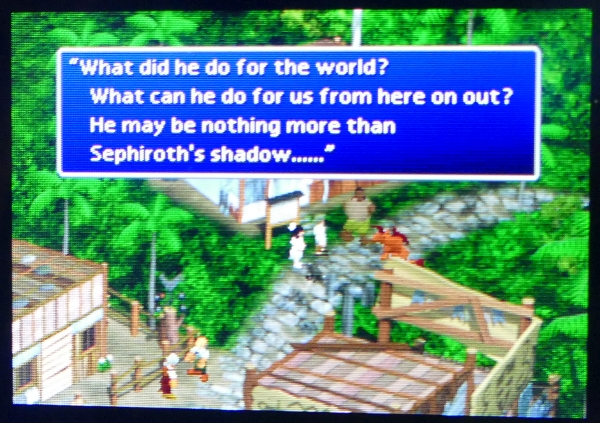
Excellent questions - raised by Barret, of course. But Tifa insists, and the game never holds Cloud accountable for anything he did.
(The doctor gives the party a notably unrealistic pep talk: "Listen, if you give up hope...what will happen to him?" This is nothing any doctor would ever say. Doctors want you to give up hope and settle down into being a reliably disabled income source as soon as possible. Silent Hill 2, a much better game, agrees with me.)
This leads to a parley aboard the Highwind between the remaining party members where starts off with Barret raising a call to action:
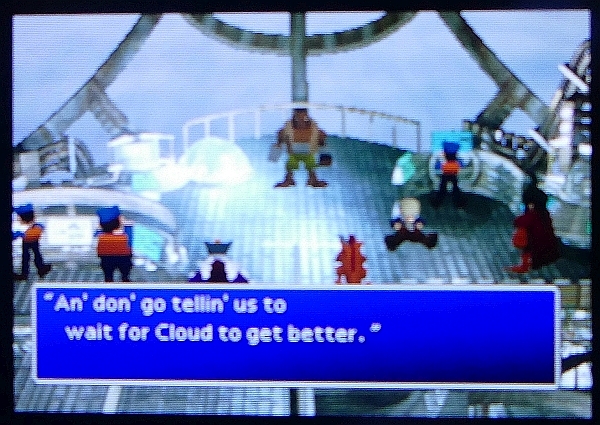
Goddamn, Barret is awesome. It also contains the following exchange:
Cait Sith: I've got news.
Barret: Yeah, what? That you a spy?
Great. Despite this exceptional start, Barret and the game conclude that Mr. Wallace "ain't cut out" to be a leader, which: Bull. Fucking. Shit. Instead, the baton is randomly passed to...Cid? Yeah, he recently had a big moment, but since his introduction until then, he's been wholly irrelevant to the story. There's absolutely no good reason why Barret can't be leader; the game's simply made up his mind that he's solely a comic-relief character, despite him being the most introspective and driven member of the cast by far.
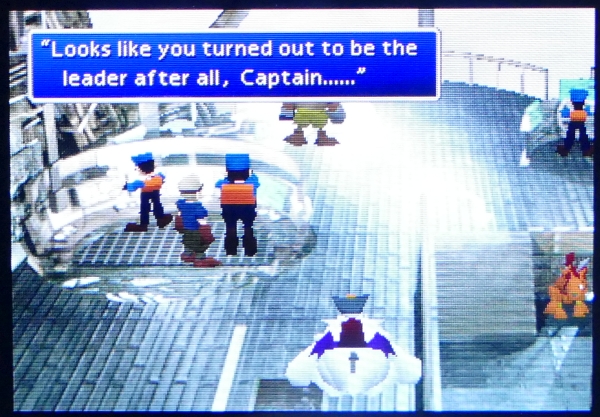
Cid is in charge for two missions: defending against Shinra's final assault at Fort Condor, and hijacking a coal train at Corel. The Condor RTS sequence was as inept as ever, though I got further than I ever have. Your little soldiers are just too unresponsive and dumb to make the game work, though. At least I don't have to see that minigame again. (Question: In earlier encounters, the holdouts at Fort Condor state that they'll be wiped out if you don't either defend them or give them enough money to hire mercenaries. Does this sequence, where the Condorites have to be alive at this point in the game to be defended, mean that that was all a lie, and the inhabitants can't die until this sequence?)
The train attack was a solid, fun, challenging sequence, though. You have to pump a mine cart to catch up with the back of the train, then battle your way up to the engine and stop the train before it barrels into Corel. You've got 10 minutes to accomplish this, and the timer doesn't stop ticking during combat or on the status screen. This was the closest I've come to failing during the game thus far: I made it with 30 seconds to spare. There's a dash of minigame stuff in the beginning and end (and I don't understand what button inputs they wanted during the latter), but the sequence mainly involves battling through a succession of enemies, each requiring different tactics, as quickly as possible. A big obstacle is factoring attack potency vs. speed - many of your big-damage attacks, such as Summons, take a long time for their animations to play out, and the clock's ticking all the while. Healing from your inventory has to happen quickly, too. I broke the seal on my high-potency recovery items and used the Comet spell (equipped on Barret) a lot.
The objectives of these missions are to obtain "Huge Materia," which, a wiki tells me, are meant to be analogues of traditional Final Fantasy crystals. (Shinra wants to use them as the explosive payload on a missile they plan to ram into Meteor to destroy it. I know this non-protagonist-powered plan wouldn't work, but I don't understand how it's a bad idea on its face - yeah, fallout from Meteor breaking up, but a) do video games ever factor that in, and b) does our party have a non-explosive plan?) Apparently, you can fail these missions, and the plot will continue, just with you not having gotten the Huge Materia. There are other drastic consequences to failure, though; if you fail to stop the train, part of Corel is destroyed, and if you lose at Fort Condor, the inhabitants are indeed slaughtered. There are more Huge Materia missions ahead. Pressure's on, I suppose.
Your final challenge as Cid is to fend off a Weapon attack on Mideel during an earthquake. The Weapon hit hard, and I was having a bit of difficulty reviving a knocked-out Cid with the timing of Phoenix Downs and heals and the Weapon's attacks. I didn't get a chance to see how I would have ultimately fared, though, as the Weapon took off after several rounds. A guide says it does this if you're "playing defensively." I don't know if I get another chance to fight it or what. The intro to the battle - where the Weapon dives from the sky toward the camera right for you, shrieking like hell - is one scary moment, though.
I don't buy that Barret would abandon Tifa during the quake just because Cid said so. Come on.
(I'm consulting guides mostly after-the-fact on stuff in the game that puzzles me, by the way. The only parts where I've used a walkthrough actively during gameplay, I think, were the ice area, to save time, and Tifa's initial turn at the wheel, to see how I could extend it. Maybe there are bits I'm forgetting. I have happened across bits like the Deathblow materia thing accidentally while looking for the section I need, though.)
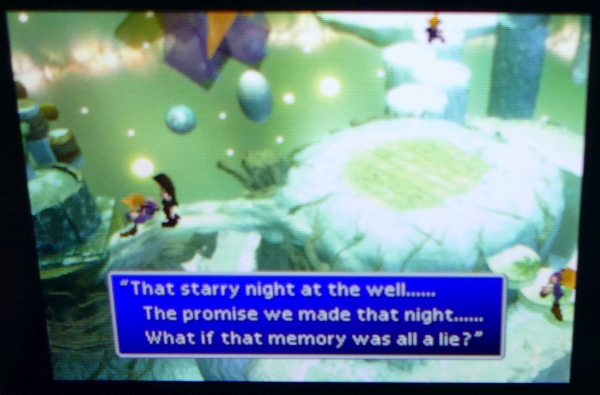
This brings us to the pivotal flashback about Cloud's memory. My reaction is much like for the larger game - I think aspects of the visual presentation are strong but find the story wanting. The presentation of Cloud's subconscious, with the green dreamscape and the multiple Clouds, including the giant floating Cloud above, is trippy and outside of anything a Final Fantasy fan would have encountered in a pre-Silent Hill world (though they're awfully quick to identify this as Cloud's subconscious, right away - don't want people getting confused!). The camera pans into the environments of Cloud's memory, complete and perfectly-preserved like dollhouse dioramas, are well-done and enhance both the unreality of what's happening and the vividness of these personal experiences. Along with scaling, the game's use of the camera is generally - generally - well-done, another example of the game's proficiency as a PlayStation tech demo (and I mean that as a genuine compliment, not as a passive-aggressive "ooh, it's just a tech demo" diss).
That said: this backstory is a nuanced, sensitive portrait of human frailty like humblebragging is an act of humility. Basically: everything was Tifa's fault because she liked all those other, nasty guys and not a nice guy like Cloud, so he ran off to Soldier in order to impress her, except he didn't get in because he was too weak - except he WASN'T too weak, and wound up proving himself Better Than All of Them, the Fools...including the real member of Soldier, who was instantly tossed out of the arena by Seph Looney Tunes-style, and the Strongest Most Powerful Warrior Ever. This is significantly stronger wish fulfillment than the backstory Cloud made up expressly for wish fulfillment - it just has a stronger, more honest tinge of resentment and superiority to it.
And while some of this is just the time in which the game was made speaking, of COURSE Tifa's mother's death is all about Cloud, and of COURSE, Cloud saves stupid Tifa from herself, but no one acknowledges that he's the REAL hero. Yeah, the game does try to temper it a bit - Cloud's jealous negging of "you were all so childish" is, thankfully, immediately countered by Tifa pointing out that, no duh, they were children - but...well, the chips lie where they fall. It's discouraging, and says a lot, that Cloud is considered the deepest, best character of the entire franchise when he's basically an entitled man-child whose delusions are affirmed and sanctioned.
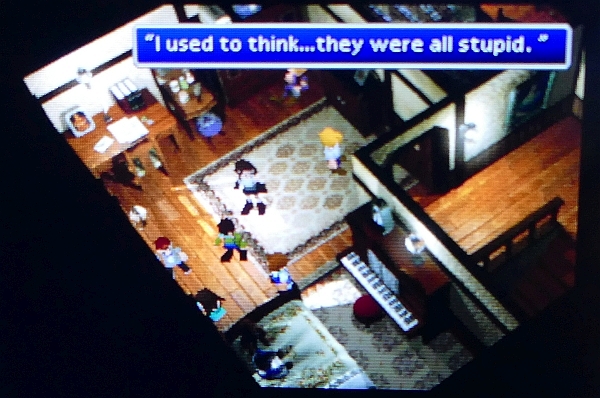
Yeah, to a degree, it's brave to have your main character's heroic past just be play-pretend, but the essential part of Cloud's account wasn't wrong. He killed Sephiroth. The explanation for the big part that doesn't add up about Cloud's story in Kalm - how DID he manage to take out Sephiroth mano a mano? - is just "because I'm that much of a badass, that's why." Granted, for the first stab, Sephiroth was distracted, but the ludicrous ending - where Cloud picks up not only the sword it's said only Sephiroth can pick up but Sephiroth himself attached to the other end and caber-tosses him over the side - kind of more than balances that out.
I don't know why Tifa was going along with Cloud's delusion. Affection might have led her to humor him a little way, but the depth of his lies here (yeah, there was mental illness, but based on Cloud's speech in the Highwind's sit room, there seemed to have been a significant degree of intentional deception as well) illustrates that he's seriously mentally ill or monomaniacal or both - too dangerous to be indulged. And what did Cloud think with Tifa going along with this? Did he really think her stupid enough to be honestly buying into his blatantly-false account over her own memory? What am I saying; of course he did. We've still got one pivotal flashback with Zack to go, I know, but there's a lot that just doesn't make sense.
(Also, big plot hole: Cloud states that becoming a Soldier involves injection with Jenova cells. The entire point of the Reunion is that every being with Jenova cells is gathering to reassemble Jenova. However: at several points in conflict with Shinra - right up until the execution escape sequence, at which point the Reunion has been completed - the party encounters functioning, intact Soldiers as enemies.)
One last complaint: I don't find Cloud's personal story strong enough a hook on which to hang an entire game. He was a washout who liked a girl and joined the army to impress her, but he didn't make the cut, so he lied about it when he met up with her again. That's an eye-rolling but rather mundane event, the stuff of mild tragicomedy, not something on which to build 50+ hours. The one extraordinary aspect of it - his Lord British-giving-an-address PK of Sephiroth - is ridiculous wish-fulfillment that doesn't mesh with the rest of the story. (It would have worked better to have Shinra grunt Cloud do *something* to attempt to stop Sephiroth - to stand up to his hero at the risk of his life, which is the part critical to character development - and be cast aside but have his distraction be the key thing that allows Zack to take him out.)
I understand the FF team might have wanted to focus on a single character's story after the dog's breakfast of 5 and the split protagonists and huge cast of 6, but this isn't an improvement over the weak point of 4: yeah, Cecil must atone for his past misdeeds, but he ends up getting everything he wants at the end. Sephiroth is trying to destroy humanity due to megalomania, but the hero is also driven by megalomania, and his arc is inevitably going to go from "How dare these people not think I'm the baddest, most important dude around!?" to "there; I am the baddest, most important dude around." The game treats that sentiment as something to prove, not outgrow. Cloud's expression of remorse aboard the Highwind for condemning every single being on the planet to death is perfunctory, like he lost a marginally-important business deal. He's learned nothing.
Onward, I guess.
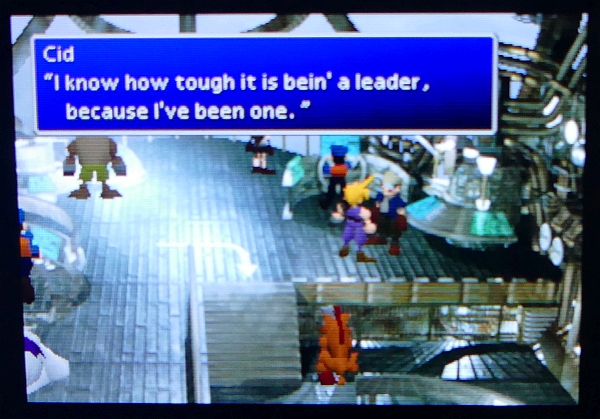
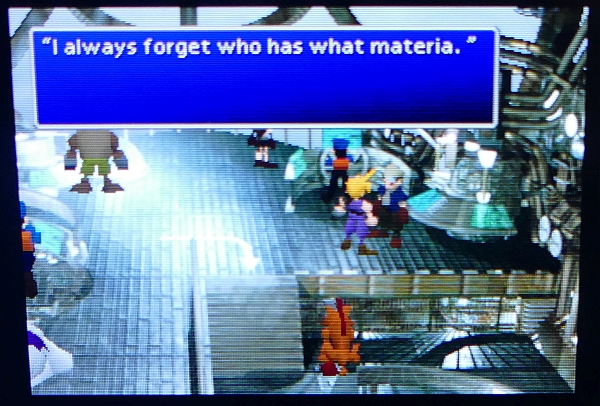
Well, that's one of the perks of going through most of the game using only three characters.

